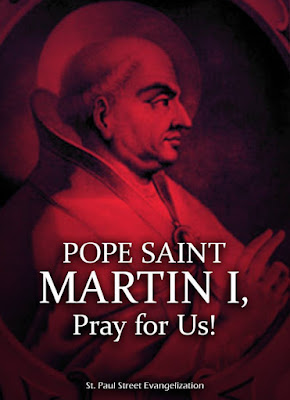Commentary: Wayback Machine. Quoth the Holy Redeemer bulletin:
Elected pope in 649, Martin I had gotten in trouble for refusing to condone silence in the face of wrong.… From there he was exiled to the Crimea where he suffered from the famine of the land as well as the roughness of the land & its people. But hardest to take was the fact that the pope found himself friendless. His letters tell how his own church had deserted him & his friends had forgotten him.'Tis also the festival of Saint Hermenegild, Martyr (died 585, also spelt Ermengild), martyred in the reign of his father, the Visigothic king Liuvigild, an Arian heretic: Martyr-link & Wikipedia-link; Heresy-link & Wikipedia-link Heresy.
'Tis also the festival of Saint Caradoc, Priest & Hermit (died 1124): Saint-link & Wikipedia-link.
'Tis also the festival of Blesseds Edmund Catherick & John Lockwood, Priests & Martyrs (died 1642), martyred in the reign of the English king Charles I, two of the Martyrs of Douai: Martyr-link Echo Charlie & Wikipedia-link Echo Charlie, Martyr-link Juliett Lima & Wikipedia-link Juliett Lima; Martyrs-link Douai & Wikipedia-link Douai.
Scripture of the Day
Mass Readings—Friday of the Second Week of Easter
The Acts of the Apostles, chapter five, verses thirty-four thru forty-two;
Psalm Twenty-seven, verses one, four, & thirteen & fourteen;
The Gospel according to John, chapter six, verses one thru fifteen.
Commentary: Reflection by Bishop Robert Barron (Word on Fire):
Friends, our Gospel today focuses on St. John’s intense meditation on the meaning of the Eucharist. The tone is set with the familiar story of the feeding of the five thousand, the only miracle story mentioned in all four Gospels. This scene deeply affected the first Christians.Video reflection by Yvonne Dilling: United States Conference of Catholic Bishops.
Jesus instructs the crowd to recline on the grass. Taking the barley loaves and dried fish, Jesus makes a meal that satisfies the enormous crowd. They are hungry, tired, and worn out from their exertions, and Jesus gives them sustenance for the day.
For Thomas Aquinas, the great metaphor for the Eucharist is sustenance, food for the journey. Baptism defines us, making us sons and daughters of God; confirmation confirms and deepens this identity; marriage and holy orders seal us in our life’s vocation. These are sacraments offered once at key moments in one’s life.
Then there is the Eucharist, which is daily food, nourishment to get us through the day-to-day. How effective would we be if we never ate, or ate only on special occasions and in a festive environment? Not very. So, in the spiritual life, we must eat and drink or we will not have the strength.
Mass Readings—Optional Memorial of St. Martin I
The Second Letter to Timothy, chapter two, verses eight thru thirteen & chapter three, verses ten, eleven, & twelve;
Psalm One Hundred Twenty-six, verse five;
The Gospel according to John, chapter fifteen, verses eighteen thru twenty-one.
Papal Quote o' the Day
"Those who deem themselves to be Christian must know this fact. They are bound my conscience to the basic, imperative duty of bearing witness to the truth in which they believe & to the grace that has transformed their soul."Little Flower Quote o' the Day
—Pope St. John XXIII (1881-1963, feast day: 11 October)
"My sword is Love, & with it I must drive out the stranger from the land, & establish Your kingdom in souls."Saint Quote o' the Day
—St. Thérèse of Lisieux, Doctor of the Church (1873-1897, feast day: 1 October)
"Do not say that you have chaste minds if you have unchaste eyes, because an unchaste eye is the messenger of an unchaste heart."
—St. Augustine of Hippo, Doctor of the Church (354-430, feast day: 28 August)

No comments:
Post a Comment